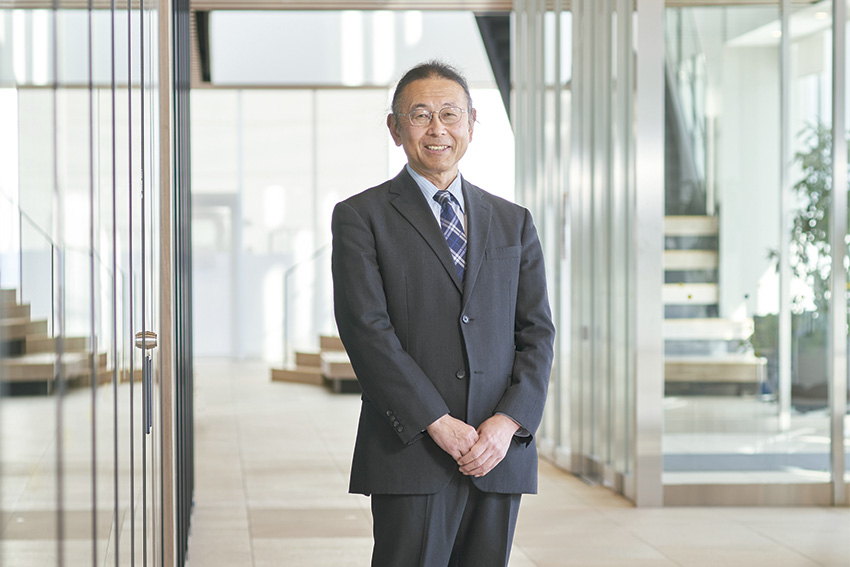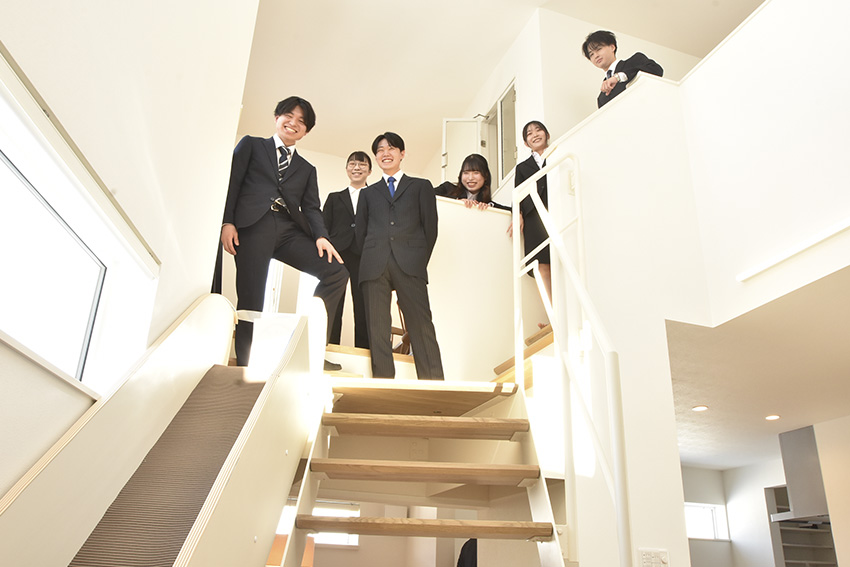For over 70 years Sapporo Gakuin University has been bringing socially responsible and democratic education to Hokkaido.

Japan faces a series of challenges, including globalization and the nation’s demographic shift, which is expected to cause a shortfall of eleven million workers by 2040. To address this situation, the government has decided to revamp its educational system with the ambitious target of attracting 400,000 foreign students to Japan by 2027. What role can universities play in addressing Japan’s challenges?
Looking at the history of how Japan has welcomed overseas foreign workers, at the beginning, it was more of a trainee system where non-skilled people were invited to Japan to go through a training process in Japanese companies. After that, it progressed to have more specialized experts. Now, it has moved to the next stage, which is accepting foreigners to study in Japanese universities and be part of Japanese society after graduation. The role that universities play is vital in providing a learning experience to foreigners about Japan and Japanese society.
With the growing number of inbound tourists in Hokkaido, the tourism industry in particular, is experiencing a shortage of people with the ability to speak the language of these visitors, so it’s important to nurture these talents. Niseko is especially popular among foreign tourists, but since there is a shortage of local people who can speak Chinese or English, foreigners are often invited to stay in Japan on a working holiday, for example, during the summer or winter seasons, to compensate for this communication gap.
Foreign students, for example, from China or Taiwan, who can speak Japanese and English, can earn higher salaries in Niseko, so there are still many high-paying job opportunities in Japan.
One issue that we have and still need to tackle is that the rate of employment and hiring for foreign students at our university is not that high. For specific numbers regarding our students, 90% of Japanese students find a job right after graduating, whereas only 50% of foreign students do because 32% of foreign students wants to go on to graduate schools. But to increase this employment rate, we have introduced an optional practical training program within the Faculty of Economics and Business Administration where students can go to a resort in Niseko as an intern for four months to use their language skills and learn about how the business is operated. Those who fit the environment will more likely remain in the business.
This has become a sticking point for many foreign students who wish to come to Japan, as they realize that sometimes the path from graduation to finding employment is challenging. On the flip side, Japan’s reputation as one of the safest countries globally, along with its modern facilities and the weakened yen, has made it more affordable to study in Japan than ever. From a university perspective, what do you believe is the added value of studying in Japan?
The uniqueness of studying at a Japanese university, particularly ours, is that we emphasize project-based learning in collaboration with companies to provide real-world and substantial learning experiences. For example, we actually built a model house produced by students together with estate developer Logos Holdings. We have also collaborated with KOSE, the cosmetics company, where students made a proposal on how to promote male cosmetics and this summer, that campaign will be used. We will also work with Daiwa House Industry, which is one of the biggest Japanese developers, on restructuring and reorganizing the Shin-Sapporo area.
These examples illustrate the strength of our university, specifically our multiple collaborations with companies and local governments, such as the Sapporo Municipal City government. These collaborations give the students hands-on experience in carrying out projects. In this way, we are promoting an open education that fully leverages the resources of our partnering companies and government administrations to strengthen the students’ abilities and interest in making societal change.
When foreign students stay on campus, they can communicate and learn from the faculty members and peer students, but there are so many opportunities to leave the campus and meet companies and the local community. By doing that, they’re able to learn about the real Japanese culture. This experience will be very helpful for those foreigners remaining in Japan and working in Japanese society.

Commemorative photo taken at the completed model house (students who participated in the project)
In addition to this project-based learning, you have several partnerships and memorandum of understanding (MOU) agreements with universities overseas to facilitate student exchanges. Some of your partner institutions include the University of California, Davis, the University of Essex. Can you explain the role these kinds of partnerships play in your business model, and are you looking to form more partnerships with overseas institutions or companies?
At this moment, our students’ main purpose for going abroad is to learn about languages, but as more interest towards the global society is nourished within our campus, it would be interesting for us to expand our MOUs to other universities, as well as NGOs, so students can have hands-on experience overseas.
Talking about the student experience, Sapporo Gakuin University has a history of nearly 80 years, dating back to 1946. You are a liberal arts university with four faculties, seven departments, and three graduate schools. Can you describe your programs, and the learning experiences you provide to students in order to help them shape tomorrow’s world, and are you looking to integrate new departments, programs, or projects in the near future?
We have two fields of study, social science and humanities. In the social science field, we have the Faculty of Economics and Business Administration, and the Faculty of Jurisprudence. A majority of the graduates remain in the Hokkaido area, working with local companies and governmental institutions. In the humanities field, we have the Faculty of Humanities and the Faculty of Psychology, and some of the students take a national exam. For example, in the Faculty of Humanities, many students become teachers after taking the teaching exam. Many students also work as certified social workers. A majority of the students in the Faculty of Psychology are studying to pass the national counseling exam to become a certified counselor.
Besides undergraduate and graduate education, Japan is prioritizing the attraction of high-caliber international talent, including doctoral and master’s students from abroad to boost its global education and research competitiveness. The newly established Council for Creation of Future Education is spearheading these efforts, supported by the ongoing JPY 10 trillion of university funding, which is intended to create an attractive research environment and reward system. How important is internationalization to your university and what initiatives have you put in place to be attractive to both foreign graduate students and faculty members?
At this moment, we’re not accommodating high-caliber overseas talent interested in our graduate level courses. Rather, we see a decreasing number of Japanese students at the undergraduate level and thus our strategy is to attract foreign students by being more internationalized.
Your university is experiencing a tough moment in its financial performance. What do you believe is the reason for this and what are you trying to do to regain competitiveness and establish yourself as the go-to university for global-minded and ambitious students?
We need more student interest in joining the university relative to the speed of the demographic shrinking of the population under 18 years old. To attract more students, we established a new campus in April 2021, which is located in the subcenter of Sapporo City and is based on the concept of "Diversity and Collaboration". By leveraging its advantageous location to promote collaboration with companies and local governments, we enhanced our project-based learning environment. Consequently, our reputation as the go-to university has grown and student enrollment has increased, leading to improved financial stability.
You talk about how interest is waning, which I find interesting. When we interviewed the president of Akita International University, he mentioned that one of the biggest challenges was the fact that it’s in Akita, which is very far and remote compared to locations such as Tokyo and Osaka, which are hubs of Japan and are well connected. As a university in Sapporo trying to gain interest, how are you overcoming the challenge of people looking away from regional centers like Sapporo or Akita and focusing instead on the Kansai and Kanto regions?
It’s important that we leverage the local natural resources. Niseko is well-known globally for its snow and our university can provide hands-on experience at Niseko resorts, so we want the overseas students to immediately associate Hokkaido with Niseko and Sapporo Gakuin University, where we provide comprehensive learning and work experience in top global resorts.
Our university brand may not be widely recognized globally, but Hokkaido and Niseko are, so we want to fully leverage their fame in spreading and elevating the value of our university.
We have made a brochure in English, Chinese, and Japanese, targeting foreign students and we are planning to market in both print and digital. We are also now working to update our English website.
As a final question, how would you define your university for global students?
For those who want to create a new business and succeed in Japan, our university has all the resources needed to support those entrepreneurially minded foreigners to be successful in Japan.
For more information, visit their website at: https://www.sgu.ac.jp
0 COMMENTS